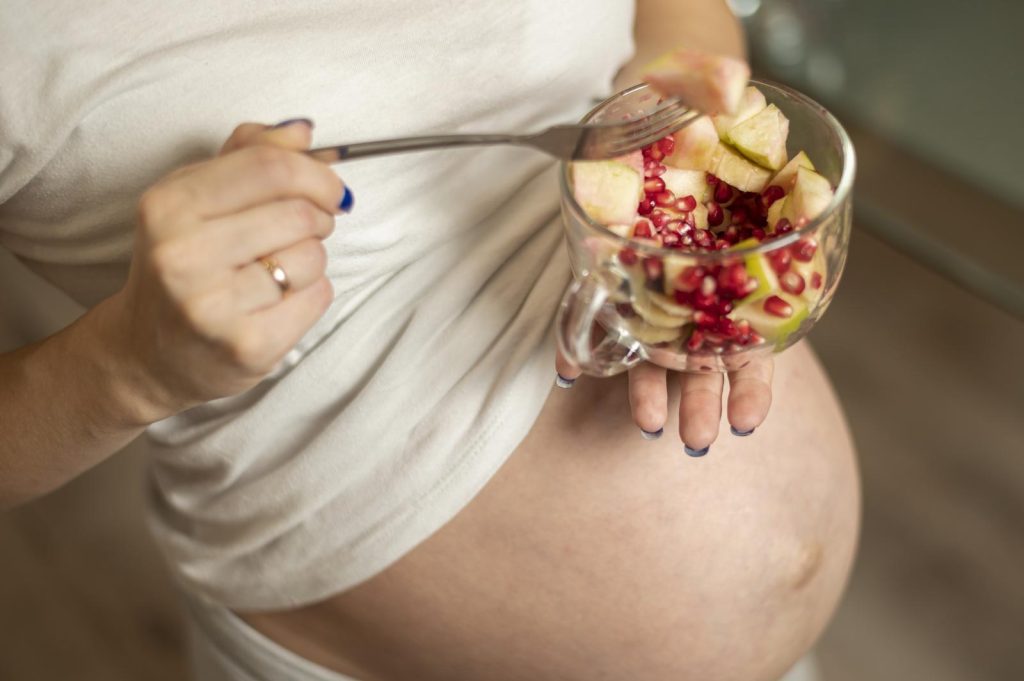Nutrition during pregnancy is important for both mother and baby. You should get enough protein, folic acid, iron, calcium and vitamins. The mother’s weight should increase appropriately according to her weight before pregnancy to prevent complications and promote the growth of the fetus.

40 weeks of pregnancy is a crucial period when the nutritional status of pregnant mothers affects the health of themselves and their fetus. Medical reports clearly confirm that complications of pregnancy such as anemia, preeclampsia, diabetes, thyroid disease, as well as premature birth and low birth weight infants are related to the nutritional status and weight gain of the mothers during pregnancy. If nutrition is inappropriate, complications may occur.
Foods that increase fetal weight
Protein
is important for strengthening the organs and muscles of the mother and baby, so a variety of protein from animals, eggs, and plants should be consumed. The amount that pregnant women need is 75-110 grams per day. In practice, to make it easier, the proportion of protein in each meal should be increased to no less than 30-40%, which should be enough.
Folic acid ,
or folate, is the first important nutrient that mothers who are about to become pregnant or are already pregnant cannot do without. This is because folate is an important nutrient for the synthesis of DNA in cells to create various organs in the fetus. There are reports of abnormal brains and unclosed spinal cord in mothers who lack folate.
Iron
is essential for the production of red blood cells, which increase dramatically during pregnancy. The blood volume in a pregnant mother’s body increases by up to 70% in order to carry enough nutrients and oxygen to the baby in the mother’s womb. เล่น UFABET ผ่านมือถือ สะดวกทุกที่ ทุกเวลา Statistics show that more than half of pregnant women are anemic from not getting enough iron.
Maternal anemia is a leading cause of low birth weight babies. The U.S. Food and Drug Administration recommends that pregnant women get at least 27 milligrams of iron per day. In addition, 15% of women of childbearing age have iron deficiency anemia, which can lead to infertility. Therefore, women in this group should consider taking iron supplements before becoming pregnant.
- Calcium is better absorbed during pregnancy. Pregnant women need at least 1,000 milligrams of calcium per day, which is not much higher than when not pregnant. Therefore, it is recommended that pregnant women who do not get enough calcium from food, such as those who cannot drink milk, should receive a calcium supplement of 600 milligrams per day.
- Multivitamins may be useful for mothers who do not have time to take care of themselves. If you want to use them, you should consult your obstetrician who is taking care of you during your pregnancy because some vitamins, such as vitamin A, in excessive amounts of more than 10,000 units per day can cause abnormal development in the baby.
Pregnant mothers in special groups must be careful.
- Vegetarian mothers should focus on vegetables and fruits that provide sufficient protein and nutrients as mentioned above. They should avoid sweet fruits that cause diabetes or be careful not to gain too much weight.
- Mothers with blood diseases, kidney diseases, diabetes, and high blood pressure should be under close care of obstetricians and gynecologists.
Pregnant mothers and their weight that need to be taken care of
The mother’s weight gain during pregnancy also reflects the development of the fetus. Because the baby’s birth weight is an important indicator of the baby’s health and growth. In addition, the mother’s weight before pregnancy also affects the pregnancy. Therefore, the appropriate weight gain should be as follows:
- Mothers with normal weight should gain no less than 8 kilograms but no more than 12 kilograms.
- Mothers who are too thin, with a BMI less than 19.8, must gain more weight than normal. During pregnancy to ensure that the baby receives enough nutrients.
- Obese mothers should control their weight to prevent excessive weight gain. But it is still necessary to gain at least 6-7 kilograms.